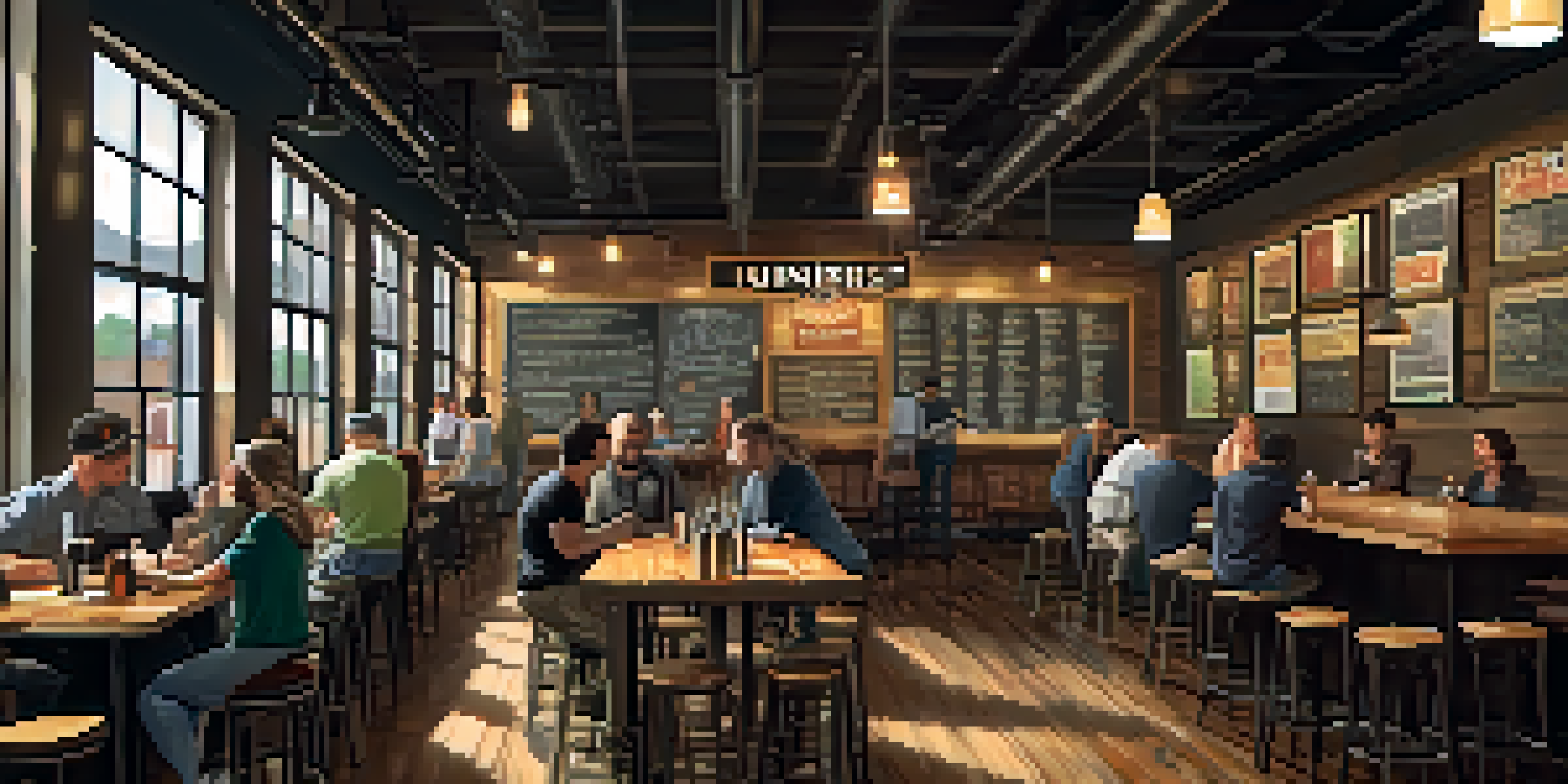Atlanta's Craft Beer Revolution: A Historical Perspective

The Roots of Atlanta's Brewing Tradition
Atlanta's brewing scene traces its origins back to the mid-19th century, when German immigrants brought their brewing traditions to the South. Cities like Atlanta became hotspots for these settlers, who established small breweries to cater to their communities. As the demand for beer grew, more establishments emerged, laying the groundwork for what would eventually become a vibrant craft beer culture.
Beer, if drunk in moderation, promotes health and longevity.
However, Prohibition in the 1920s dealt a heavy blow to these early breweries, forcing many to close their doors or pivot to other products. Despite the setbacks, a few survived and continued to produce beer illegally, showcasing the resilience of Atlanta's brewing spirit. This tumultuous period would shape the future of the industry, leading to a slow but steady revival after the repeal of Prohibition in 1933.
The post-Prohibition era saw a gradual increase in breweries, but it wasn't until the late 20th century that the craft beer movement began to take hold. Beer enthusiasts and adventurous homebrewers began to view brewing as both an art and a science, sparking a renewed interest in local, unique flavors.
The Craft Beer Boom of the 1990s
In the 1990s, Atlanta experienced a craft beer renaissance, fueled by a growing consumer demand for diverse and high-quality brews. This era witnessed the birth of several influential breweries, including SweetWater Brewing Company, which opened its doors in 1997. Their flagship 420 Extra Pale Ale quickly became a local favorite, symbolizing the rise of Atlanta's craft beer identity.

As more breweries began to pop up, the city's beer culture evolved, offering a plethora of styles and flavors that appealed to a wider audience. This newfound enthusiasm for craft beer inspired local festivals, tastings, and events, further solidifying Atlanta's status as a craft beer destination. Beer lovers flocked to local taprooms, eager to explore unique brews that highlighted the creativity of Atlanta's brewers.
Atlanta's Brewing History
Atlanta's brewing tradition began in the mid-19th century with German immigrants and evolved through challenges like Prohibition.
Additionally, the establishment of the Georgia Craft Brewers Guild in 2013 helped to unite and promote local breweries, advocating for favorable legislation and increasing awareness of craft beer in the state. This collaboration proved essential for the continued growth of the craft beer scene in Atlanta.
The Role of Local Ingredients and Innovation
A defining characteristic of Atlanta's craft beer scene is its emphasis on local ingredients, which has led to innovative brewing practices. Many Atlanta breweries prioritize sourcing hops, grains, and other materials from local farms, fostering a strong connection between the community and its brewers. This commitment to local sourcing not only enhances the flavor profiles of their beers but also supports regional agriculture.
Craft beer is a reflection of the community it comes from; the flavors of its ingredients tell the story of the land and the people.
Breweries like Orpheus Brewing and Creature Comforts have gained recognition for their creative use of seasonal ingredients, crafting unique brews that reflect the flavors of the South. This trend has encouraged other breweries to experiment, pushing the boundaries of traditional beer styles and leading to the creation of exceptional, one-of-a-kind offerings. Beer lovers in Atlanta can often find exclusive brews that showcase local flavors and ingredients.
Moreover, this innovative spirit extends beyond just ingredients. Many Atlanta breweries are embracing new technologies and brewing techniques, allowing them to create a diverse range of styles that cater to varying tastes. This willingness to experiment has helped Atlanta become a hub for craft beer innovation.
The Rise of Beer Culture and Community
As Atlanta's craft beer scene has grown, so too has the culture surrounding it. Breweries have become social hubs, where locals gather to enjoy a pint, share stories, and connect with their community. Taprooms often host events, from trivia nights to live music, creating a sense of camaraderie among patrons and fostering a welcoming atmosphere.
This strong sense of community extends beyond the breweries themselves, with local beer festivals and events celebrating the craft beer culture. Festivals like the Atlanta Summer Beer Fest and the Georgia Craft Brewers Fest draw huge crowds, showcasing the talents of local brewers and providing a platform for them to share their creations. These events not only promote local breweries but also encourage a sense of pride in Atlanta's craft beer identity.
Craft Beer Renaissance
The 1990s marked a craft beer boom in Atlanta, leading to the establishment of iconic breweries and a vibrant beer culture.
Additionally, Atlanta's craft beer scene has made strides in inclusivity, welcoming diverse communities to participate in the brewing experience. Breweries are increasingly focused on creating spaces that are inviting to everyone, recognizing the importance of diversity in fostering a vibrant beer culture.
The Impact of Legislation on Craft Breweries
Legislation has played a crucial role in shaping Atlanta's craft beer landscape. In the early years, restrictive laws and regulations made it difficult for small breweries to thrive. However, a series of legislative changes over the years have paved the way for growth, allowing breweries to offer tastings, sell beer on-site, and distribute their products more freely.
One significant turning point was the passage of the 2017 beer legislation, which lifted the cap on the amount of beer breweries could sell directly to consumers. This change allowed Atlanta's breweries to flourish, enabling them to expand their operations and reach a wider audience. As a result, many breweries have seen a significant increase in sales, contributing to the overall growth of the craft beer industry in Georgia.
Furthermore, these legislative changes have fostered a more competitive environment, encouraging breweries to innovate and improve their offerings. With fewer barriers to entry, aspiring brewers are now able to pursue their dreams, enriching Atlanta's craft beer culture and ensuring its continued evolution.
Challenges Faced by Atlanta's Craft Breweries
Despite the growth and success of Atlanta's craft beer scene, challenges remain for local breweries. The market is becoming increasingly saturated, with new breweries opening regularly, creating fierce competition for consumers' attention. This abundance of choices can be overwhelming for beer enthusiasts, making it essential for breweries to differentiate themselves and stand out in the crowd.
Additionally, the COVID-19 pandemic presented unprecedented challenges for many breweries, forcing them to adapt quickly to changing circumstances. Many establishments pivoted to takeout sales and outdoor seating to survive, while others explored new avenues like online sales and merchandise. This adaptability showcased the resilience of Atlanta's craft beer community, but it also highlighted the importance of innovation in overcoming obstacles.
Future of Craft Beer Innovation
The future of Atlanta's craft beer scene looks promising, focusing on sustainability, local ingredients, and community collaboration.
Another challenge is the rising cost of ingredients and production, which can strain smaller breweries. As the demand for craft beer continues to grow, so does the cost of sourcing quality ingredients. This reality forces many breweries to balance quality and affordability, ensuring they can remain competitive while still delivering exceptional brews.
The Future of Atlanta's Craft Beer Scene
Looking ahead, the future of Atlanta's craft beer scene appears bright, with continued growth and innovation on the horizon. As more consumers seek out local, unique brews, breweries will likely continue to adapt and evolve their offerings. This trend may also lead to an increase in collaboration among breweries, fostering a sense of camaraderie and shared goals within the industry.
Moreover, sustainability is becoming a key focus for many breweries, with an emphasis on environmentally friendly practices. Initiatives like waste reduction, water conservation, and energy-efficient brewing processes are gaining traction, ensuring that the craft beer industry remains both profitable and responsible. This commitment to sustainability will resonate with consumers who are increasingly concerned about environmental impact.

Ultimately, Atlanta's craft beer revolution is a testament to the power of community, creativity, and resilience. As the scene continues to grow, it will undoubtedly leave a lasting mark on the city's culture, forging connections and memories over a shared love of exceptional beer.